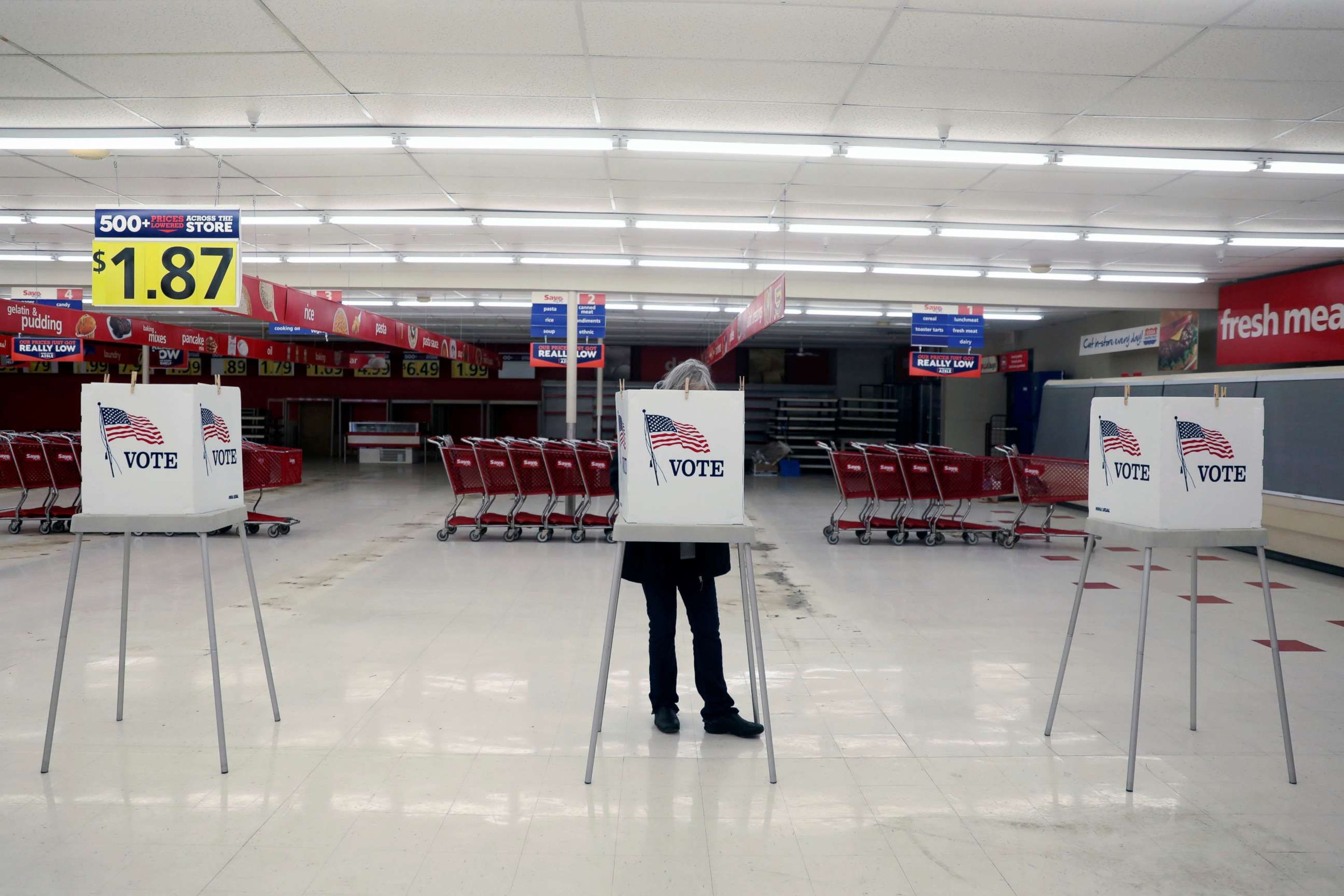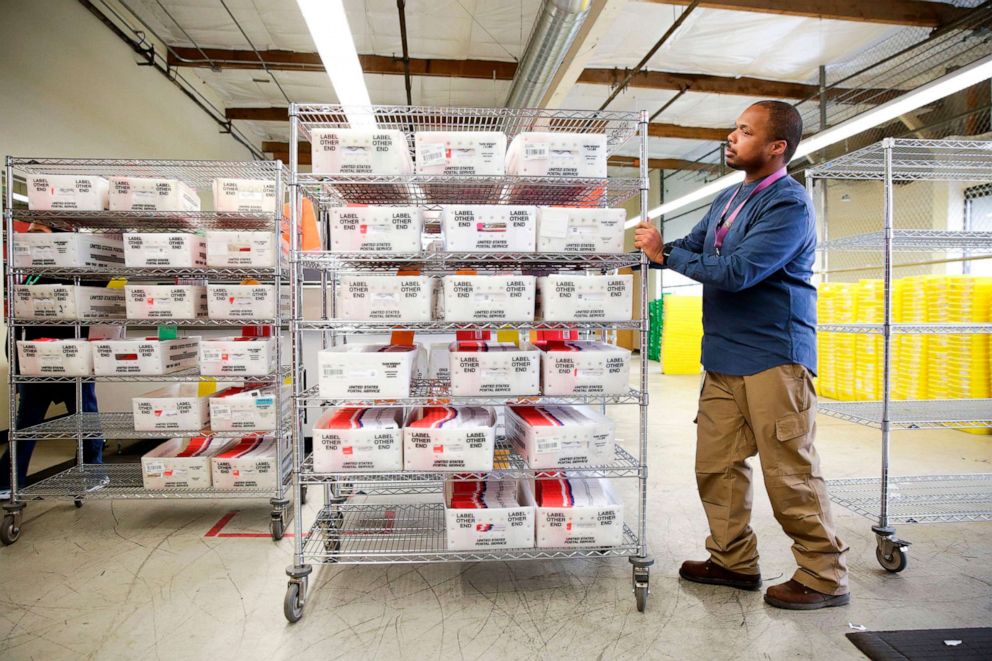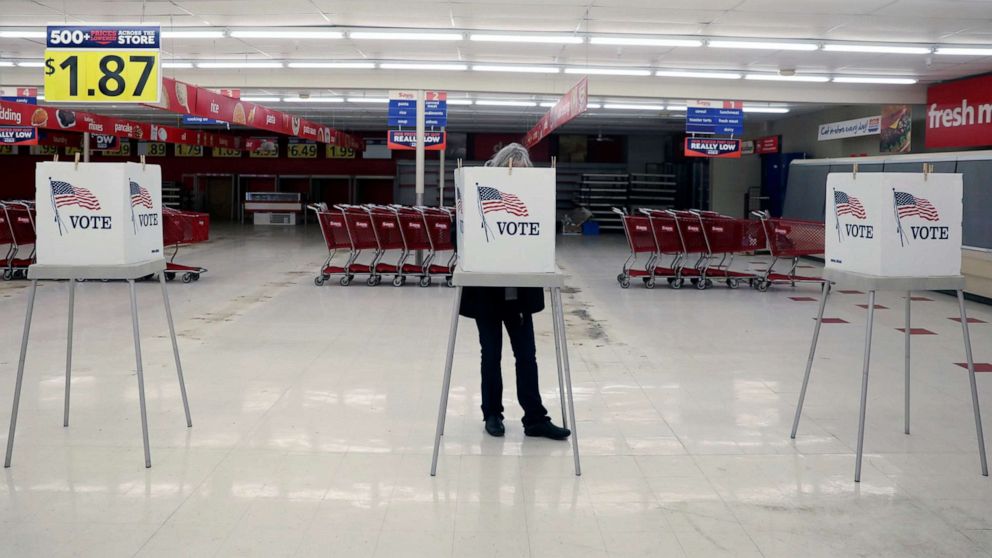The Note: Voting in age of coronavirus gets uncertain test runs
The TAKE with Rick Klein
Life will presumably return to normal someday. Voting, though, is likely to never look the same.
Amid broad concerns about voting access, and in a year that saw a caucus debacle in Iowa, the way Americans vote was already shifting. Then the national emergency surrounding coronavirus blew up the Democratic primaries as we knew them.
How the pieces fit back together is uncertain, given the patchwork of voting laws and conflicting political urgencies that make shifting dates and voting methods near-impossible on a moment's notice.
A smattering of local runoffs in Arkansas on Tuesday will bring the first significant in-person voting since the nation essentially went on lockdown. Amid legal challenges and conflicting messaging from state and local authorities, it's expected to be an almost-normal election day, albeit one with low turnout expected.
Next week's primary voting in Wisconsin will be a bigger -- and more controversial -- lift. It has drawn five lawsuits and counting, as Democrats look to expand registration and absentee voting, and local officials seek to minimize voters' risk of exposure.

As for taking such efforts national by November, President Donald Trump on Monday was unusually blunt in explaining why he opposed vote-by-mail and absentee-voting expansions as part of the latest relief package.
"The things they had in there were crazy," the president told Fox News about Democrats' funding requests. "They had things, levels of voting, that if you ever agreed to it, you'd never have a Republican elected in this country again."
The novel coronavirus does not respect political boundaries, though they are sometimes being accentuated in red-versus-blue talk of the moment. But even discussing changes to the voting process is exposing political divides that won't heal when the country is well again.
Tune into ABC at 1 p.m. ET and ABC News Live at 4 p.m. ET every weekday for special coverage of the novel coronavirus with the full ABC News team, including the latest news, context and analysis.
The RUNDOWN with MaryAlice Parks
The American people have gone to war against the coronavirus, the question is, should there still be more of a unified offensive instead of hundreds of local battles.
The crisis has brought shared experiences, of course: layoffs, furloughs and kids at home. It's a new normal for people in all states.
There have been amazing examples of giving and charity across state lines: Supplies sent to hard-hit cities and medical professionals bravely leaving their home states to travel to the frontlines where their expertise will save lives as the number of cases and hospitalizations surge.
But as Trump continues to see politics everywhere, he makes it hard for a hurting nation to feel joined together.
On a phone call with governors, Montana Gov. Steve Bullock told the White House that they did not have the necessary tests to adequately trace infections and keep the spread at bay. The president replied that he had not heard there was a problem and praised the number of tests done in other places. Speaking later to reporters he relished in his impression that governors were "saying thank you."
Monday he also called House Speaker Nancy Pelosi a sick puppy and her district a "slum."

New York Gov. Andrew Cuomo urged the country to look past any political differences, "We are at war, there is no politics. There is no red and blue, it's red, white and blue," he said and hopefully more in Washington heard him.
THE TIP with Meg Cunningham
Voting is slated to take place in 12 Arkansas counties on Tuesday for primary runoff elections, despite heightened concerns over the coronavirus and its spread. It will be the first day of in-person voting since the March 17 elections and poll workers have taken precautions.
In Grant County, voters will have their temperatures taken before casting their ballots and will only be allowed into the polling site one at a time. In Jefferson County, the clerk is setting up drive-thru voting at her office so that voters can remain in their vehicles and the poll workers -- wearing gloves and a mask -- can collect the ballots.
"Runoff elections aren't heavily attended anyway," a Benton County employee told ABC News before adding that she doesn't expect a high turnout on Tuesday based on "the fact that we have had an incredibly large number of absentee ballot requests."

The day will be a test of how voting could look come November, as the coronavirus continues to upend elections nationwide.
THE PLAYLIST
ABC News' "Start Here" podcast. Tuesday morning's episode features ABC News Chief Business and Economics correspondent Rebecca Jarvis, who lays out our new economic reality as we face at least 30 more days of restrictive recommendations from the federal government. And, ABC News Chief Medical correspondent Dr. Jennifer Ashton answers a common question: should we all be wearing masks? http://apple.co/2HPocUL
Five Thirty Eight Politics Podcast. In recent days, President Donald Trump's approval rating has hit its highest point since the early days of his presidency. The FiveThirtyEight Politics Podcast team discusses why and suggests it may not be a good longterm indicator for the president. They also discuss where exactly we are in the arc of the COVID-19 crisis and explain the political debate surrounding the Defense Production Act. https://53eig.ht/2Jb12X2
Download the ABC News app and select "The Note" as an item of interest to receive the day's sharpest political analysis every weekday.
The Note is a daily ABC News feature that highlights the key political moments of the day ahead. Please check back tomorrow for the latest.




